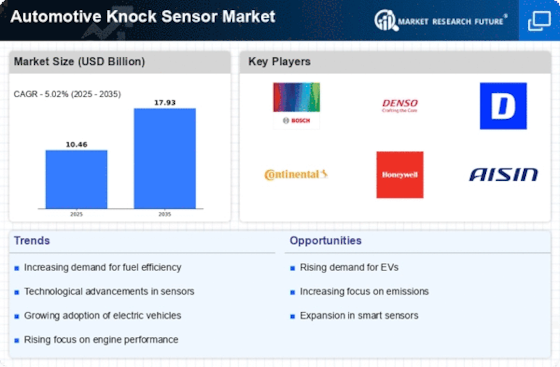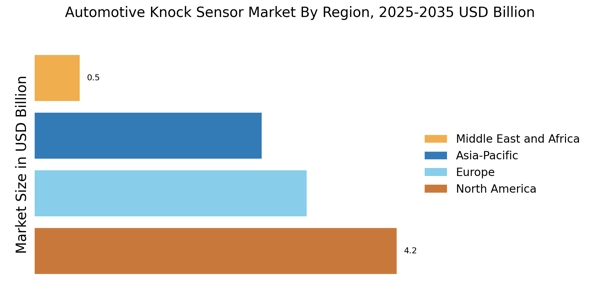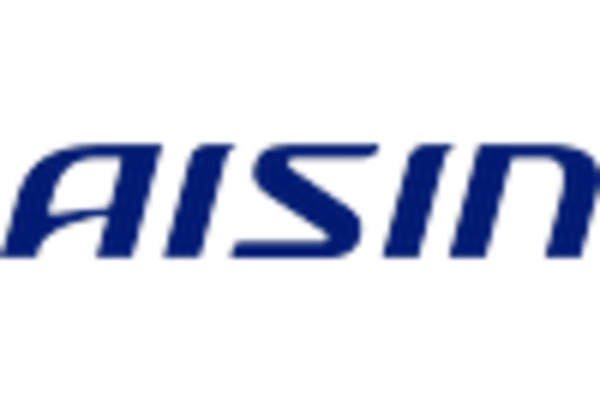Stringent Emission Regulations
Stringent emission regulations are a significant driver for the Automotive Knock Sensor Market. Governments worldwide are implementing stricter standards to curb vehicular emissions, compelling manufacturers to adopt technologies that enhance engine efficiency and reduce pollutants. Knock sensors are essential in achieving optimal combustion, which directly impacts emissions levels. The market for automotive emissions control technologies is projected to grow, with estimates suggesting a value of over 30 billion dollars by 2025. As manufacturers strive to comply with these regulations, the demand for knock sensors is likely to increase, positioning the Automotive Knock Sensor Market as a critical component in the quest for cleaner transportation solutions. This regulatory landscape not only influences product development but also shapes the competitive dynamics within the industry.
Growth of the Electric Vehicle Market
The growth of the electric vehicle market is poised to impact the Automotive Knock Sensor Market in various ways. While electric vehicles (EVs) do not rely on traditional combustion engines, the increasing hybridization of vehicles necessitates the use of knock sensors in hybrid powertrains. As the market for electric and hybrid vehicles expands, the demand for advanced engine management systems, including knock sensors, is likely to rise. Projections indicate that the EV market could reach a valuation of over 800 billion dollars by 2027. This shift towards electrification may lead to innovations in knock sensor technology, as manufacturers seek to optimize performance across diverse powertrain configurations. Thus, the Automotive Knock Sensor Market may find new opportunities for growth amid the evolving landscape of vehicle electrification.
Increasing Demand for Fuel Efficiency
The Automotive Knock Sensor Market is experiencing a surge in demand for fuel-efficient vehicles. As consumers become more environmentally conscious, manufacturers are compelled to enhance engine performance while minimizing fuel consumption. Knock sensors play a crucial role in optimizing combustion, thereby improving fuel efficiency. According to recent data, vehicles equipped with advanced knock sensors can achieve up to 15% better fuel economy compared to those without. This trend is likely to drive the adoption of knock sensors, as automakers strive to meet consumer expectations and regulatory standards. Furthermore, the push for fuel efficiency aligns with broader industry goals of reducing greenhouse gas emissions, making the Automotive Knock Sensor Market a pivotal player in the transition towards sustainable transportation.
Technological Innovations in Sensor Design
Technological advancements in sensor design are significantly influencing the Automotive Knock Sensor Market. Innovations such as piezoelectric sensors and MEMS technology are enhancing the accuracy and responsiveness of knock detection. These advancements allow for real-time monitoring of engine conditions, leading to improved performance and reduced emissions. The market for automotive sensors is projected to grow at a compound annual growth rate of approximately 7% over the next few years, indicating a robust demand for sophisticated knock sensors. As manufacturers continue to invest in research and development, the Automotive Knock Sensor Market is likely to benefit from the introduction of next-generation sensors that offer enhanced durability and reliability, further solidifying their importance in modern engine management systems.
Rising Adoption of Advanced Driver Assistance Systems (ADAS)
The integration of Advanced Driver Assistance Systems (ADAS) is becoming increasingly prevalent in the Automotive Knock Sensor Market. As vehicles evolve towards greater automation, the need for precise engine control becomes paramount. Knock sensors are integral to ensuring optimal engine performance, which is essential for the functionality of ADAS features such as adaptive cruise control and collision avoidance systems. The market for ADAS is expected to witness substantial growth, with projections indicating a value exceeding 100 billion dollars by 2026. This growth is likely to drive demand for advanced knock sensors, as manufacturers seek to enhance vehicle safety and performance. Consequently, the Automotive Knock Sensor Market stands to gain from the rising trend of integrating sophisticated technologies into vehicles.

















